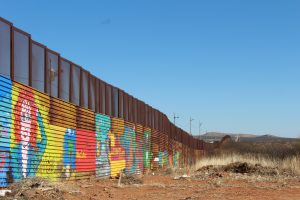- Slug: BC-CNS-Migrant Foster Parents. 810 words.
- Photos and captions below.
By REBECCA SPIESS
Cronkite News
FLAGSTAFF – Kelly Eckhoff tearfully remembers her time as a foster parent for children picked up at the border.
“It didn’t matter how old they were, what gender they were, what country they came from,” she said, looking at her husband, Matt. “Every single one of them loved to be read to every day.”
The Eckhoffs were raising their year-old son when they entered a pilot program to foster immigrant children in 2015, so their house was full of children’s books. No matter their age, no matter whether they understood English, the children were eager to hear the words read aloud.
“What U.S. 12-year-old would curl up in your lap and read a picture book, a board book?” she asked. “It was always a highlight of my day.”
The Eckhoffs were part of the yearlong pilot program to provide temporary housing for unaccompanied migrant children picked up at the U.S.-Mexico border. Most came from Mexico, Central America and South America.
“Knowing that you have a family that loves you, that will sit and rub your back at night if you’re crying for Mom, that makes a huge difference,” Kelly Eckhoff said.
The Refugio program, supported by Neighborhood Ministries, an organization fighting poverty in Phoenix, was financed by a one-year grant that started in January 2015. The program offered shelter to 25 children at a time who were placed with registered foster families living in Phoenix. The Eckhoffs were living in Phoenix when they became foster parents to Arizona residents and migrant children.
Kit Danley, president of Neighborhood Ministries, which he founded in 1982, said program representatives want to relaunch the program by next year. They were denied federal grant funding in 2016, but renewed scrutiny of family separations at the border might lead to funding from the federal Office of Refugee Resettlement. Danley said the organization will know by October whether the organization will receive a grant.
The Eckhoffs fostered eight children, ages 3 to 12, at different times during the year, usually for two to three weeks. Many of the children, traveling with smugglers or sometimes alone, had crossed hundreds of miles to reach the U.S.
“We were shocked by the resiliency of every one of these kids,” Kelly Eckhoff said. The Arizona children they fostered often arrived traumatized by family abuse or neglect. But the migrant children were there for a different reason.
“They are so incredibly loved that their families have risked everything to send them to the United States,” she said. “All of the children were coming to be reunited with a family member.”
The Eckhoffs remember one child in particular: a 10-year-old boy who had made the journey from Mexico alone. They said he had been stabbed and robbed before reaching the border.
“His attitude was so matter-of-fact,” Matt Eckhoff said. “That’s what struck me as so incredible. What 10-year-old in our society would get stabbed and talk about it as if it was just a normal action that takes place?”
After staying with the Eckhoffs, the boy was reunited with his mother in New York. He had not seen her for three years.
“These are minors who are met at the border and are automatically put in deportation proceedings,” Matt Eckhoff said.
The most difficult part of the migrant fostering experience was not knowing what happened to the children once they left, the Eckhoffs said. Maybe they were reunited with family in the U.S. Maybe they were deported. Under program policy, foster families were “not allowed to have any follow up or communication about the closure of the cases,” Matt Eckhoff said.
The couple said they understand those who might criticize them for focusing on migrant children when many Arizonan children are in need of foster care. Still, the couple, who have fostered five Arizona residents, were glad they also were able to offer migrant children a respite.
“To me, children are children,” Kelly Eckhoff said. “It doesn’t matter where they were born or what actions their parents have taken. I don’t think we should punish children for their parents’ actions.”
The Trump administration’s “zero-tolerance” policy, announced in May, has separated more than 2,000 children from their parents at the border.
The couple, now the parents of two children who are 5 and 2, said the policy gives fostering a new urgency.
“I look at my son and my daughter, and I think, ‘It could have been them,’” Kelly Eckhoff said.
A revival of the pilot program could bring new challenges for foster parents and children, including longer parent-child separations and less clarity about the timelines for reunification.
But the Eckhoffs recommend that others take on the fostering experience.
“We’re not going to say it’s the easiest thing on the face of the planet, and there’s an emotional toll that comes with it,” Matt Eckhoff said. “But it is worth it and it is incredibly important.”
Follow us on Twitter.
For more stories from Cronkite News, visit cronkitenews.azpbs.org.
^_=

